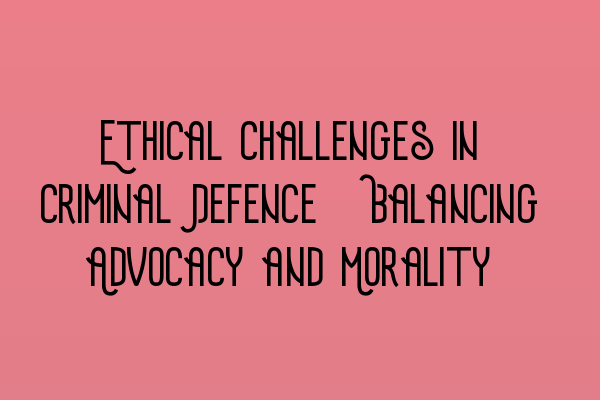Ethical Challenges in Criminal Defence: Balancing Advocacy and Morality
As criminal defence solicitors, we face numerous ethical challenges in our practice. We are entrusted with the duty to defend our clients, making sure they receive a fair trial and have their rights protected. However, this responsibility often poses a dilemma – how do we balance our duty as advocates with ethical considerations and personal moral beliefs?
One of the fundamental ethical challenges we encounter is the question of advocating for clients whom we may believe to be guilty. Our duty as solicitors is to provide zealous representation, ensuring our clients’ legal rights are upheld. However, there may be instances where we have private knowledge or strong suspicions of our client’s guilt. This puts us in a precarious position where we must navigate our moral compass while fulfilling our professional obligations.
The key to addressing this ethical challenge lies in upholding the principles of the legal system. Our responsibility as criminal defence solicitors is not to pass judgment but to ensure that our clients receive a fair trial and due process. By focusing on the principles of justice and the presumption of innocence, we can separate our personal beliefs from our duty as legal advocates.
Another ethical challenge we face is the duty to maintain client confidentiality. Confidentiality is a cornerstone of the lawyer-client relationship, protecting the trust and openness necessary for effective representation. However, there may be instances where maintaining confidentiality conflicts with our moral obligations, such as when a client confesses to a serious crime.
In balancing advocacy and morality, it is essential to consider the broader implications of breaching client confidentiality. While it may be tempting to disclose information to prevent harm or uphold justice, doing so undermines the trust clients place in us and jeopardizes the overall integrity of the legal system. Instead, we must rely on our professional judgment and seek guidance from legal ethics committees when faced with such dilemmas.
Related Articles:
- SQE 1 Practice Exam Questions
- SQE 1 Practice Mocks FLK1 FLK2
- SQE 2 Preparation Courses
- SQE 1 Preparation Courses
- SRA SQE Exam Dates
In conclusion, criminal defence solicitors face inherent ethical challenges in balancing advocacy and morality. By prioritizing the principles of justice, upholding client confidentiality, and seeking guidance from legal ethics committees, we can navigate these challenges while ensuring the fair treatment and rights of our clients. It is an ongoing process that requires continuous reflection and adherence to professional standards.
